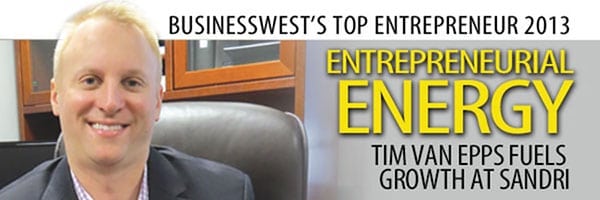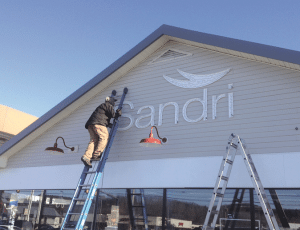
Entrepreneurial Energy
Tim Van Epps Fuels Growth at Sandri
 Mike Behn was in Boston, “on a mission.”
Mike Behn was in Boston, “on a mission.”
His assignment in that spring of 2005 was to essentially finish the work started by his boss, Bill (W.A.) Sandri, the previous Christmas to recruit Sandri’s son-in-law, Tim Van Epps, to be the next leader of the Greenfield-based Sandri family of companies. At the time, the enterprise was known for its gas stations stretched across Western Mass., New York, Vermont, and New Hampshire, but was also dabbling in everything from golf courses to real estate.
Behn, who was then running the motor-fuels division for the company and is now COO, didn’t believe this would necessarily be a hard sell, but he understood that he had some work to do to bring Van Epps west. After all, the then-29-year-old had a highly lucrative job managing a portfolio for Mellon Financial, and was clearly enjoying life in New England’s largest city.
“I was out in Boston finding my way, and I think I was doing pretty well,” Van Epps recalled. “My wife and I just bought our first condo right in the Back Bay — we were right where we wanted to be. And I had the best job in the world; I was probably putting in a total of 30 hours a week, and I had things on autopilot. Everything was going great.”
But Van Epps was admittedly getting bored with this life, and this mindset dovetailed nicely with the two things Behn said he had to sell to his recruit: lifestyle — meaning both quality of life and the rewards that would eventually come to the president of such a company — and, especially, opportunities.
Elaborating, he said the latter came in the form of waking up a company that he called a “sleeping giant.”
Indeed, while Sandri was, by most accounts, doing well, with more than 100 gas stations in its portfolio and an exclusive agreement with Sunoco that covered New York and New England, it was not growing, said Behn, adding quickly that, in this business, that means it was going backward.
“We were in a corporate coma,” he told BusinessWest. “I told Tim there were so many things we could do to make more money for this company and make it bigger and better than it was; it had been sleeping for years. I think that kind of talk definitely had an impact.”
So much so that Van Epps took his father-in-law’s offer, which amounted to a 60% pay cut — “I thought my wife was going to kill me at the time” — and came to Sandri as executive vice president.
To say that he woke up the company — and that he was certainly not bored as he did so — would be huge understatements.
He grew Sandri from an oil company into a $250 million, full-service energy firm, dealing in everything from wood pellets to photovoltaics. He has also expanded the main businesses, gas stations, through imaginative initiatives that have produced a 60% increase in the total number of gallons sold (the main measuring stick in this industry) to more than 70 million, with plans to get to 100 million in the near future.
One of his latest endeavors has been a push into the highly competitive convenience-store market. The Sandri name is now on five such facilities, and the ambitious goal is to increase that number to 25 or 30 over the next five years.

Movement into the convenience-store market, including this location in Orange, is one of the many new business ventures launched by Tim Van Epps since he joined Sandri nearly a decade ago.
And there has been some divestiture in recent years, most notably selling off Fox Hollow, the company’s golf course in Tampa, Fla. — “it just didn’t fit into the portfolio anymore,” said Van Epps — as well as its lubricants business and some underperforming real estate, with the proceeds from those sales funneled into other ventures, or “redeployed,” as he put it.
But overall, Van Epps has brought needed energy, of a different kind, to this company, and for his efforts he has been chosen as BusinessWest’s Top Entrepreneur for 2013, thus joining an eclectic mix of business leaders and organizations that have received the award since it was launched in 1996.
“Like those honored before him, Tim personifies the entrepreneurial spirit that has defined this region for more than 200 years,” said BusinessWest’s publisher, John Gormally. “He has fueled the imagination of the Sandri company and positioned it for continued growth.”
Entrepreneurial Drive
Van Epps said his grandfather-in-law, Acilio Remo (A.R.) Sandri, was a colorful character with a keen mind for business, a healthy appetite for real estate, and a way with words.
“One of the things he used to say to me was, ‘we don’t sell dirt, son,’” recalled Van Epps, adding that A.R.’s M.O. was to buy property — he acquired a lot of it on or near Route 91 in the ’60s and ’70s, for example — and hold onto it, on the theory that someday it would prove itself worthy of the investment.
Well, Van Epps does sell dirt — he’s unloaded a number of parcels in recent years, on the theory that the proceeds from unused or underutilized property, on which the company had been paying taxes, could help Sandri grow some of its other ventures.
And that’s just one of the ways he’s distinguished himself from previous generations of company leadership. Van Epps said that, when he arrived, he had little appetite for standing pat — which is essentially what the company had been doing for several years — and went about his business with what he called a “day trader’s mentality.”
Before getting into what he meant by that, it’s necessary to set the stage for his arrival and chronicle the first 78 years of the company.
Our story starts with A.R. Sandri, who was born in Barre, Vt., but grew up in Greenfield. Soon after graduating from high school, he took a job working as a clerk for the Pan-Am Oil Co., and in 1930, he was offered a lease on a gas station at 155 Main St. in Greenfield, and subsequently started the A.R. Sandri Co. Recently renovated, that station is still in the company’s portfolio, and a landmark of sorts in a service area created and then greatly expanded by A.R. and W.A. that came to be known within the corporation simply as ‘Sandri Land.’
Its borders were broadened greatly in the ’40s, ’50s, and ’60s, as A.R. began buying up real estate along what would become the I-91 corridor. At the same time he was bulking up his portfolio, A.R. was expanding the company into a fuel distributor and seller of heating oil, lube oil, and other related products. In 1964, he inked a deal with Sunoco to fly that company’s flag exclusively over the stations he was acquiring, and by 1969, he had 50 stations, as well as 2,200 heating-oil customers and 230 commercial and farm gasoline accounts.
In 1973, W.A. took the reins of the company, and within a few years he would launch initiatives that would achieve explosive growth. The most significant of these came in 1976, with the buyout of all Sunoco’s stations in Vermont and Southern New Hampshire, as well as New York, making Sandri, then with about 140 stations, the largest distributor of Sunoco gasoline, fuels, and lubes in the country.
Under W.A., the company bought a number of home-heating-oil companies, while also growing the lubricants business and developing some related ventures. And in 1987, he took Sandri in a completely new direction — golf.

While the company has sold its golf course in Florida, it remains an aggressive player in the golf business and plans more improvements to Bernardston’s Crumpin-Fox, seen here.
A few years into the new millennium, W.A., who passed away just over a year ago, started to get serious about succession planning and transitioning the company to the next generation of ownership, whomever that might be. Behn said there was no one in the Sandri family ready or willing to take over, and as a result there was actually talk of selling the enterprise. But eventually, W.A. set his sights on his son-in-law.
Van Epps remembers Christmas 2007 and, in particular, a discussion with W.A. over a single-malt scotch.
“We were sitting by the fire, and he said, ‘it’s becoming very common for in-laws to join family businesses,” he recalled. “He asked me if I would be interested in having a chat about the Sandri family of companies. And then he dropped it. A few weeks later, I was out skiing at Tahoe, and he called and asked if I wanted to come to Florida and meet his team.
“I liked what they were doing — I was curious about it,” he went on, adding that this curiosity turned into hard interest. “Then Mike came out, and we talked brass tacks.”
Burning Desires
Van Epps said the ensuing transition in leadership was a somewhat difficult time for both him and the company. “Stressful” was a word he used more than a few times to describe it, and “culture shock” was a phrase he borrowed to sum up what both he and most of his employees were going through.
He said the company was pretty set in its ways by the time he arrived, which meant, in his estimation, that it had lost a good bit of its entrepreneurial zeal.
He didn’t waste any time trying to find it again, and admits that this abrupt shifting of gears didn’t sit well with everyone. Meanwhile, Van Epps wanted to create his own team, rather than inherit one, and this resulted in some additional stress.
“You had people who were used to working for the former COO, and they were used to doing things their way,” he said. “I came in, and I wanted to change pretty much everything in the company, and when you have new blood that comes in and you have change, it’s stressful.
“From 2005 to 2008, it was pretty stressful to work at Sandri with all the changes that were happening,” he continued. “We lost some employees — I wanted some new blood in here, and I knew, when I came in here as an in-law, that I was going to have to operate this company as if it was my own money, and that’s exactly what I did.
“I had the mentality of a day trader — I guess I wanted instant gratification,” he went on. “And then you come to a company that’s been around for 80 years, and that’s not how it works.”
Moving quickly amid this culture shock, Van Epps put most of his focus on transitioning Sandri into a diversified energy company, a move that might seem to run counter to logic if one of the main products it sold was heating oil, but Van Epps believed it made perfect sense.
And he cited the move into the wood-pellets business — the company is now the largest marketer of bulk and bagged wood pellets in the country — as one example.
“In 2009, when the price of fuel oil went to $5 a gallon, we saw a runoff of our gallons of about 20%,” he recalled. “We wanted to know where those folks were going, and we soon discovered they were going to wood pellets, so we decided to get into that business.”
In March 2010, the company was awarded a $3.2 million grant from the Mass. Department of Energy Resources, which has been used for a variety of purposes, including the purchase of a small fleet of wood-pellet delivery trucks and the installation of several institutional, commercial, and residential renewable-energy systems, including facilities at Greenfield Community College, the Greenfield fire station, and other locations.
The company has made similar forays into solar and geothermal systems, and has met Van Epps’s goal of becoming what he called a “one-stop shop and energy company of the future.”
Getting Pumped
Beyond this diversity, though, Van Epps and his team have also fueled growth of the company’s core business — gasoline and gas stations — and recorded that aforementioned surge in the number of gallons sold.
That jump has come through some imaginative initiatives, including a partnership with the grocery store chain Price Chopper, which is a major player in New York and has a few stores in Massachusetts and other New England states.
Price Chopper teamed with Sunoco in one of the early rewards programs that have become prevalent in recent years, said Behn, adding that the lure of becoming one of the redemption stations for the program has prompted a number of formerly competing distributors to become Sandri partners.
“People could get 10 cents a gallon off for every $50 in groceries they purchased, with no limit on how much this could accumulate,” he explained. “We did a test in Keene, N.H., and the results were phenomenal. At that point, Tim and I went to Sunoco and said, ‘can we expand this program throughout our marketing area?’”
Sunoco agreed, and the program expanded first into New York state and then other regions, including Western Mass.
“We said, ‘we’ll give you coverage wherever you have a Price Chopper store; if we don’t have a Sunoco station, we’ll find one,’” Behn went on. “Tim and I hit the road, and in 2008, we convinced a number of distributors that are similar in structure to Sandri to take down their existing brand sign and put up a Sunoco sign, because they saw the power of the Price Chopper program.
“We’d go in with a PowerPoint and say, ‘here’s the program … you’re our first choice, and if you don’t want it, we’ll go to our second choice,’” he continued. “We didn’t miss on one, and now we have several distributors that used to be competitors that we’ve made into partners; it’s been a win-win for both of us.”
Another contributor to that surge in volume for the company has been its ability to convince independent station owners to take down rival fuel company flags and convert to Sunoco, said Behn, adding that, while the Price Chopper program is certainly a factor in the company’s success with conversions, Sandri’s quality of service and the fact that station owners can get the president of the company on the phone also play a big part in what is an ongoing source of growth.
Meanwhile, the company has been changing the nature of its portfolio in some respects, said Van Epps, as he returned to A.R.’s quote about dirt — and how he doesn’t agree with that sentiment.
Over the past several years, Sandri has sold many of its gas stations, redeployed that capital into other pursuits, and gained new wholesale customers in the process. In so doing, the company that once owned 140 stations now owns roughly 80 and supplies another 80, said Van Epps, adding that this shift toward becoming more of a wholesale company creates greater balance of fixed and variable margins.
A Matter of Convenience
Looking ahead, Van Epps said he still has that day-trader mentality, and is looking at ways to both geographically expand Sandri Land and, especially, make it more densely populated with business opportunities.
One of those ventures is the push into the highly competitive world of convenience stores, he said, adding that the company began to explore options in this realm roughly two years ago.
The initial thought was to embrace what Van Epps called the “urban model” of convenience stores, with the company leasing out its locations to a regional or national operator.
“We had meetings with some of these people, but at the 23rd hour, I decided that we could do this ourselves, and do it better ourselves,” he explained, adding that the Sandri name first went on such a facility early last year, and the current business plan calls for investing $25 to $30 million in what might eventually be 35 to 45 more stores.
“We’re calling these our ‘convenience stores of the future,’” said Van Epps, with four now operational — in Orange, Lee, Greenfield, and West Lebanon, N.H. — and more in the pipeline, with both new construction and rehabbing of existing facilities planned.
The challenge moving forward is to differentiate these stores in a very crowded market, said Behn, adding that Sandri intends to do that with such amenities and programs as free ATMs, 99-cent coffee, and customer-service representatives that reflect the company’s values.
And while the company sold its Florida golf course, it is by no means getting out of the golf business, said Van Epps, adding that it is essentially regrouping at a time of growing competition and challenge in this industry.
Elaborating, he said that when Crumpin-Fox was launched, there was very little competition in the high-end side of the business, both in this region and across the state, and as a result, golfers from around New England found remote Bernardston and made at least once-a-year pilgrimages.
But over the next two decades, the landscape changed considerably, with new courses such as the Ranch in Southwick and clusters of layouts — in Plymouth, for example — that gave the golfing public more options, which they have exercised.
This new environment has prompted Sandri to invest more than $1 million in the course, said Van Epps, adding that the immediate goal is to prompt golfers to “rediscover Crumpin-Fox.” Meanwhile, the company will look to sell more of that aforementioned dirt — some of the 600 acres the course sits on — for housing developments.
Looking back, and also ahead, Van Epps believes he and his team have the company positioned for stability and steady growth.
“Did we do everything right in the beginning? Absolutely not, but we’re at the point where I think we’re on the right track,” he told BusinessWest. “There’s no question that this company, which is operating in Franklin County, is going to be a lot bigger and a lot more successful than it’s ever been.
“We’re able to do some things now that we weren’t able to do in the past,” he went on. “We have a lot of pretty neat things going on here.”
Pedal to the Metal
Returning to that mission he went on in Boston to both recruit and “vet” Van Epps, Behn remembers meeting him at a Back Bay restaurant for lunch.
“This was his turf — it was a really exciting restaurant with a lot of young executives going in and out,” he recalled. “I said to myself, ‘I don’t think he’s going to want to leave this.’”
To make a long story short, he did. And the rest, you might say, is history very much still in the making.
Indeed, this is a story where some of the chapters have been written, but many are still in Van Epps’s imagination, waiting for the day trader to bring them to fruition.
“Bill and A.R. both wanted to see this company go on for five or six generations, probably more,” he said. “Five years from now, this company may not look like it does today, and that excites me; it gets me out of bed every morning and keeps me coming in here — the ability to go in any direction that we see fit to create growth and vibrancy.”
In other words, the sleeping giant is now wide awake.
Previous Top Entrepreneurs
• 2012: Rick Crews and Jim Brennan, franchisees of Doctors Express
• 2011: Heriberto Flores, director of the New England Farm Workers’ Council and Partners for Community
• 2010: Bob Bolduc, founder and CEO of Pride
• 2009: Holyoke Gas & Electric
• 2008: Arlene Kelly and Kim Sanborn, founders of Human Resource Solutions and Convergent Solutions Inc.
• 2007: John Maybury, president of Maybury Material Handling
• 2006: Rocco, Jim, and Jayson Falcone, principals of Rocky’s Hardware Stores and Falcone Retail Properties
• 2005: James (Jeb) Balise, president of Balise Motor Sales
• 2004: Craig Melin, president and CEO of Cooley Dickinson Hospital
• 2003: Tony Dolphin, president of Springboard Technologies
• 2002: Timm Tobin, then-president of Tobin Systems Inc.
• 2001: Dan Kelley, then-president of Equal Access Partners
• 2000: Jim Ross, Doug Brown, and Richard DiGeronimo, then-principals of Concourse Communications
• 1999: Andrew Scibelli, then-president of Springfield Technical Community College
• 1998: Eric Suher, president of E.S. Sports in Holyoke
• 1997: Peter Rosskothen and Larry Perreault, then-co-owners of the Log Cabin Banquet and Meeting House
• 1996: David Epstein, president and co-founder of JavaNet and the JavaNet Café
George O’Brien can be reached at [email protected]





